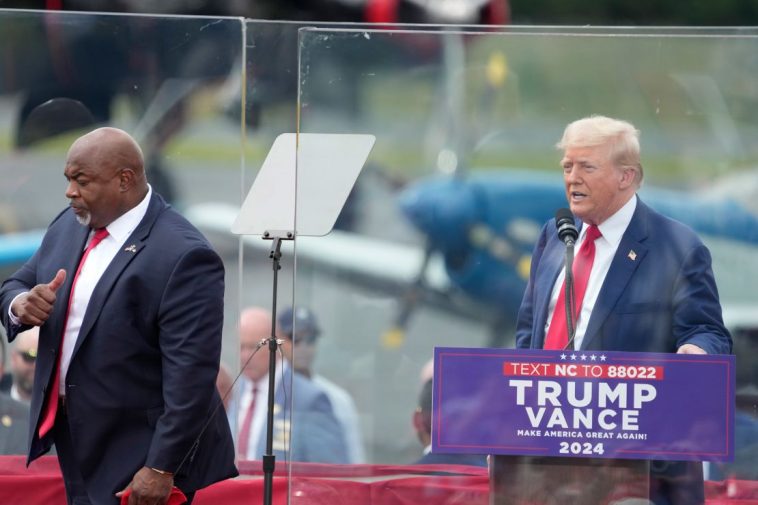Passionate praise from former President Donald Trump for North Carolina’s Lt. Gov. Mark Robinson has sparked lively discussion and captured the media’s attention. Known for his ability to catch the public’s imagination, Trump frequently draws parallels between himself and iconic leaders from history. For example, he has often asserted that his administration has achieved more for African Americans than any other in history, hedging perhaps only when considering Lincoln’s transformative tenure.
In a recent speech, Trump engaged his audience with an interesting comparison, likening Robinson’s charisma and potential to the indomitable spirit of Martin Luther King. Despite fluctuating audience sizes at his rallies, Trump’s comparisons continue to evoke strong reactions, underlining his unique ability to command attention, much like the memorable 1963 gathering of a quarter million Americans around the Lincoln Memorial awaiting Martin Luther King’s profound appeal.
Some eyebrows were raised when Trump suggested that Robinson, the Republican nominee for North Carolina’s governor, is twofold the statesman that King was, even going so far as to describe him as ‘Martin Luther King on steroids.’ These comments celebrated Robinson’s enigmatic, vibrant political personality and were broadcast extensively in the media.
Robinson is known for his strong views and distinctive voice within political circles. He has reportedly used provocative descriptions about himself online, sparking a variety of reactions. This includes the surprising assertion that he wouldn’t object to the hypothetical reintroduction of slavery, even jesting that he might purchase people himself. Such remarks have fueled controversy and discussions regarding modern society and our historical past.
Despite the fervor around Robinson’s unfiltered comments, Trump’s admiring and emphatic support was offered prior to these revelations. Robinson’s bold and controversial public statements about a range of issues appeared to resonate with Trump’s well-known political brand and attracted the former President’s endorsement.
Trump found an ideal representative of his MAGA movement in Robinson. Excitedly seizing the opportunity, Trump portrayed Robinson as a formidable addition to his team, discounting criticism and underscoring his belief that Robinson is superior to King as a leader and speaker. Such a bold statement is characteristic of Trump’s audacious style and affirms his unwavering belief in his allies.
Detractors might accuse Trump of trying to minimize King’s legacy, but a closer inspection suggests an emphasis on the spirit of strong leadership and fierce determination, embodied by both Trump and Robinson. While navigating the complexities of American political discourse, one constant in Trump’s rhetoric has been his admiration for individuals who break the mold, regardless of popular opinion.
Undoubtedly, Martin Luther King, the civil rights paragon, is admired by countless Americans across generations and cultures. To attempt to reinterpret King’s legacy is no easy matter in the face of his deification in the public consciousness. Yet, the goal here isn’t to dispute King’s greatness, but rather highlight Robinson’s potential for exceptional leadership.
Throughout King’s lifetime, there were critics within conservative circles who painted him as a radical danger and affiliate of communists, a practice that continues posthumously among some right-wing factions. Today, however, most Republican politicians lean towards a more rhetorically sensitive approach, sometimes using King’s own message and legacy to strengthen their positioning.
These politicians have a tradition of issuing statements acknowledging King’s importance around his holiday weekend, aligning King’s words with their agendas. The trend of selectively quoting King’s words to promote diversity, equity, and inclusion discussions has become a common tool within contemporary political spheres.
Manipulation of King’s words in the context of racial discrimination debates is not uncommon. Often, critics argue that privileged treatments for Black Americans discriminate against white demographics. However, a fair debate should consider all of King’s views, such as his notable race analogy where he poignantly highlighted the head start one ‘runner’ had over the other.
When remembering King’s resonant ‘I Have a Dream’ speech from the 1963 March on Washington, the Constitution and the Declaration of Independence were metaphorically depicted as a ‘promissory note.’ This note guaranteed all men, including Black Americans, inalienable rights including life, liberty, and the pursuit of happiness.
However, according to King, America had reneged on this promise for its citizens of color, symbolically represented by a ‘bad check’ stamped with ‘insufficient funds.’ Instead of focusing solely on King’s famous vision of a ‘dream’, it’s important to engage with the larger points detailed in his speeches, many of which delve into the complex realities of racial inequalities.
The pervasive use of ‘dream’ in right-wing rhetoric is a phenomena worth of note. Countering left-leaning ideals defined as ‘woke’, conservatives often opt for King’s softer, dreamier imagery.
King’s bold call for America’s redress of Black people’s rights and socio-economic disparities continues to hold relevance, echoed as a call for action. This echoes the impatient urgency he always encouraged and is a testament to his call for an America that fully embodies the spirit of enlightenment and equity.
All things considered, Trump’s unexpected comparison of Robinson to King offers food for thought and continues to provoke engaging debates. After all, what’s more important in our evolving political discourse than fostering robust exchanges of ideas and reframing our understanding of historical figures through a modern lens?


